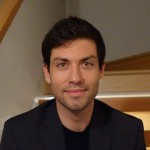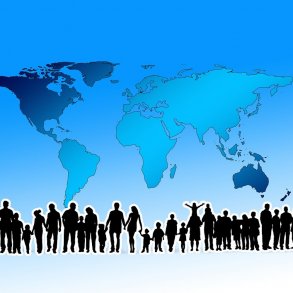By Chris Clark for Enlivening Edge Magazine
Frederic Laloux is not doing what he’s supposed to do. It could drive a person crazy.
This summer, his hugely successful book Reinventing Organizations metamorphosed into a new form: a wiki, distilling and transposing the book’s contents into an online format. More than a hundred writers and editors were involved in the project, which essentially open-sourced and liberated the content from its author.
Cue the record-scratch what the…? moment: Creative Commons? Not the typical next move of a successful writer.
We’re more familiar with this story: book blows up, writer embarks on speaking tour, publisher solidifies the brand, author writes the sequel. And in the case of Reinventing Organizations that story would be justified. I’ve met a handful of strangers in coffee shops because I saw them reading the book and felt compelled to start a conversation. I’ve spent the last year helping guide the Whidbey Institute through their own transition to Teal (the new organizational paradigm described in the book) because of these kinds of chance encounters with a whole community of enthusiastic change agents. That teal butterfly on the book’s cover has become ubiquitous. It’s one hell of a brand.
After the launch of the wiki, Frederic and I sat down to talk about exactly that: the future of the Reinventing Organizations “brand.” Not surprisingly, as soon as I mention that word I get a bemused chuckle from Frederic.
“I’m quite purposeful about not using that word, or any other words connected to the typical ‘Orange’ marketing paradigm,” he says. ‘”I don’t consider myself, or this book, to be like a washing powder that needs to be marketed.”
His answer feels coherent with the major themes of the book. Yet I find myself a little frustrated by his response. The book’s success, relevancy, and immediacy beg the question. So I try again.
“Sure,” I say, “But where do you see all of this going?”
Because it’s going somewhere
In the early days of the wiki, I had a conversation with a CEO about his company’s journey to a self-management paradigm.
“The first time I read R.O., I thought, this is it,” the CEO said. “This is what we needed at the company; this is what we need everywhere. I’ve been handing work off to more people, and started focusing on convening people locally to have more conversations about Teal. It just feels that important.”
And then he said something I hadn’t heard anyone else say yet. Something I’ve heard a thousand times since.
He said, “I want to support the movement.”
I know what he means, because having led transformation work and lived into this thing called Teal for a while now, I can say with certainty: there is no going back. The benefits of working inside this paradigm are compelling from the outside, but from the inside, they become essential. So like many people I’ve spoken with since, I have a real vested interest in this Teal thing catching on. We have skin in the game. We’re passionate.
Passion is like fire. It thaws us out and gets us moving. Passion is a guiding light in the darkness. But it can also burn. Desensitize us to what’s outside the circle of firelight. That kind of passion is what we call blind zeal. It turns the fire into a basecamp, and those outside the circle into objects to convert or eliminate. That’s the energy of revolution.
If I’m being honest, this energy is present in me, in my conversation with Frederic. “Where is all this going?” Implicit in that question is the assumption that the person you’re asking is responsible for the answer. So in other words, I’m asking Frederic “Are you our leader?”
Just lead us how we want and nobody gets hurt
Recently a very large, influential company in an industry infamous for crippling bureaucracy initiated a conversation with Frederic about the possibility of transitioning their entire organization to self-management. The relationship had an awkward beginning. Trying to schedule a conversation with the CEO, Frederic set some strong parameters around when he was available and for how long. With a sense that he is meant to live a simple life, and with small children at home, Frederic’s life is structured around his family and his home. Spending time in planes and hotels is not the life he wants to lead right now. Trying to schedule an initial meeting with the CEO, Frederic said he was willing to take the train for a one-day meeting. Failing that, what about skype?
“That’s not going to work,” said the assistant trying to set up the meeting with the CEO. “If the train can’t get you here on time, we need to put you on a plane the day before, and set you up in a hotel overnight. Skype is not an option.”
To the extreme annoyance and incomprehension of the assistant, Frederic declined. There was more back and forth. Finally, the assistant said in exasperation, “What is it with you?”
In other words, “Don’t you know what part you play here? Don’t you know your role? This is the CEO of a very big company. People don’t say ‘no’ to the CEO like this. They jump on planes. That’s what we expect. Who do you think you are?”
This is what those transitioning to Teal want to change. It’s Empire Era stuff all over again: bow to the crown prince, kiss the ring of the Queen. Power structures turning people into objects. Who do you think you are? We know how a CEO should act.
We know how a consultant should work.
We know how a successful author should behave.
We know how a movement leader needs to show up.
So here I come, months later, asking Frederic the question, “Where is all this going?” With all my expectations around Visionaries and Movements tied up in the question. With all my hopes and dreams for the future of “Teal” bound up in the asking. Reinventing Organizations lit a fire. Now I want to be a part of the revolution, and it’s time to set up basecamp. So lead us, Fred.
“Where is all this going?”
And I think Fred senses all of this in my question when he says, “I don’t know.”
“I see the book as being one wave in what’s really an ocean,” he says. “There is so much energy out there around this topic, that it would be foolish for me to pretend I know how this energy will manifest and bloom. To stay with the metaphor of nature that is so present in ‘Teal’: nature in all its abundance is incredibly efficient; it often uses very little energy to achieve a lot. That’s what I sense my role should be.
“This is an interesting period for me, figuring out what this role could be in the midst of everything happening around the book. There is much in our culture that pushes me to be become a public person, to try to milk this unexpected success. I regularly get approached by people who want to help me market this on a grand scale, to help me become a brand.
“But I know that just doesn’t feel like something I want to do. I sense that a more powerful stance, paradoxically, is not to be a forceful, highly visible leader, but to hold a space where everyone who has energy and talent to contribute feels invited. That’s how lots of things start to bubble up, to appear out of nowhere that I could never have imagined, couldn’t have forced into existence.
“That also seems to fit well with my temperament. I personally don’t have a need to be very visible, to be center stage, to be carrying the torch of a movement. On the other hand, when I’m on a stage, I really have a blast, so if there are some places where the visibility the book has given me can be put to good use, I won’t shy away from it.
“So my question to you and to others is: Where do you want to take this budding movement? What initiative will you take? I’m happy to be a sparring partner in the process, and if I can, to give a nudge at a critical juncture.”
Nudges. Can a sea-change in our society – a movement, a revolution – survive on nudges?
“The energy to reinvent organizations is out there, I don’t need to try and create it. People keep approaching me with ideas and things they want to contribute. People around the world offering to pay to make a translation happen. A wonderful person in upstate NY who bought himself a home studio to record an audiobook version, and he turns out to have the most amazing voice and talent, even though he has never done this before. Two people stepping up to create Enlivening Edge, a Teal newsletter, and a month later they are a team of 20 people. Someone in Brazil who wants to create a software game: 52 weeks in a Teal company. And I could go on… Isn’t that amazing?
“They don’t need much from me, other than perhaps an encouragement, or to be put in touch with someone else. Now let’s imagine for a minute that at the outset, I had created a masterplan of where I want us to be in 3 years’ time or in ten years’ time. I’ve worked for a long time at McKinsey, a consulting firm, and believe me, I could still make you a plan that would look pretty impressive.” (Fred laughs). “But the Teal companies I researched taught me how much more powerful sense and respond can be, compared to predict and control. If I tried to control what’s happening, to force this into a certain direction, I would be severely limiting its potential. I’m convinced that many people wouldn’t have stepped up if they felt the course was already charted.
“So I’m trying to learn what it means to hold the space, to invite, to be visible as much and as little as I think is needed. And be surprised, just as much as you, by how this all unfolds.”
Vive la teal?
What we’re seeing now is a fractal pattern implicit in this new way of working. The same mindset that drives our wanting to write masterplans is the same mindset calling for revolution. We can move beyond both. What we’re after isn’t an ideal state, a promised land, a dream. What we want is fluid, adaptive, and human. If we do this Teal thing right, the only guarantee is that we’ll be surprised.
That’s what happened for Frederic. Perhaps the book never would have emerged at all if the author hadn’t been willing to ask a different kind of question of himself. In 2011, he realized, almost from one day to the next, that he could no longer work in his capacity of executive coach and consultant with the large, traditional and pretty soulless organizations he had been working with. From an interview with Enlivening Edge:
“I figured the right question for me was, what would be the most meaningful thing I could do with my life right now? Not even ‘with my life in general?’, not ‘how could I have most impact with my life?’ No, just what is most meaningful thing right now. I figured: if I do that, I trust that the universe will help and will provide me with an income. I just couldn’t believe that if I did the most meaningful thing I could do the universe wouldn’t support me. And when I put the question in this way, the answer was immediate. I wanted to focus on two projects that felt profoundly meaningful to me. And one was the research that led to the book Reinventing Organizations.”
After Frederic and I hang up, I sit for a while and wrestle with the irony. I wanted the Reinventing Organizations Movement strategic plan. I wanted a leader to rally around. Instead Frederic handed me the same invitation he extended to himself, three years before that teal butterfly ever graced a book cover. It’s the same invitation extended inside Teal to anyone.
It’s natural to ask “Where all this Teal stuff is going?” but perhaps we’re outgrowing that sort of question. We’ll never know where we’re going until we are further down the road, and look back and see what has unfolded. The only thing that makes sense is to ask the one question that life keeps posing to its constituents, every moment of every day. It’s a question pulling equal parts trust and responsibility out of the asker. It’s a simple question: evolutionary, my dear Watson.
“What’s next?”
The good news, and the hard lesson, is that it’s up to us.
Have you made the shift from planning to sensing and responding? Where is your edge right now? What lessons have you learned along the way? Share your experience in the comments below.
Chris Clark partnered with Frederic Laloux and others to create the Reinventing Organizations Wiki, and Discourse sites. He lives in the shadow of the mountains near Seattle, Washington, helping guide organizations near and far transitioning to teal structures and practices.







Good article!
The concept of retrospect coherence came up when reading… from Dave Snowden and his Cynefin framework: in complex systems we can only see afterwards what lead to what… no ‘result’ can be seen upfront.
Ria, thanks!
Your comment reminds me of another layer not touched on by the article–how asking “what’s next” as a practice might scale in systems where there are lots of individual actors making sense-and-respond level decisions, but we elect controllers and planners to maintain an ideal level of coherence (like the economy). What would happen if rather than elect or anoint the best planners, we looked for people who were adept at sensing/responding?
By the way, I think “Retrospect Coherence” would make a great name for a band. 🙂
Hi
I want to translate this article in german. Could you give me the permission to do that?
It will be published here: https://changeologen.wordpress.com/
Kind regards
Michael
Michael, I’m so pleased you want to translate. What a gift. Thank you.
With pleasure, Michael!
To my knowledge that will be the first German translation, and you’ve certainly picked a great article for that.
There’s a group in Chile interested to create a Spanish edition of Enlivening Edge. If and when there was enough interest in a German edition, we would be happy to collaborate on developing it.
Love your work!
And we love, Robert, your bringing developmental stages to boardroom work! Is any of your clients Teal-curious? How do they perceive the breakthroughs of the RO book?
I loved reading this post, Chris. Thank you. It was such a human and honest take on your conversation with Fred. The ‘what next? It’s up to us’ message is so powerful. I realised in reading your article that I learnt this over a year ago in my NLP training when the trainer talked about ‘learning to be in the ‘not-knowing’ state’. After that I began to take lots of risks and make big decisions in my life – quitting my job, moving countries, setting up my own business – and none of it felt particularly scary. I think there’s also a key message in RO about the power of people. As individuals, we don’t have to have all the answers. This is especially true for founders, CEOs, leaders… I heard a lovely quote at Meaning Conference recently: None of us is as smart as all of us. So putting an intention out there, asking for help, sensing and responding by speaking to other people – these things for me have led to many wonderful outcomes.
Great article, it feels spot-on and real and I love it – as I love the book. Now it’s up to us – I am looking forward!
Fabulous stuff Chris.
Perhaps some of your – our? – confusion is that Fred is a rare ‘leader’ who actually does walk his talk…?
He talks about creating spaces for others… and then he actually goes and does it too!
And this feels kind of peculiar. We’re mostly just not used to it 😉
Even with my two or three decade involvement in things Integral, Second Tier – now labeled Next Stage/Teal – I dread to think what the actual ratio between the talk and the walk is! 😉
I sometimes wonder what a ‘Learning History’ case study of Ken Wilber’s Integral Institute would have told us…? (Ken did once promise a 40-page PDF history of the Integral Institute, but it never appeared).
Though I guess it’s inevitable when something so different starts to emerge that a lot of talk will come before we all manage an adequate walk. I think when I interviewed Bill Torbert for the Anti-Hero report on post-heroic leadership, he was talking about a 500 year shift – yikes…! 😉
Thinking of ‘the movement’, only a few minutes ago I got a call from my sister to say that self-managed organisations were being discussed (again!) on BBC Radio 4. Though this time not quite so favourably as this programme I wrote about before: https://enliveningedge.org/media/business-thinker-gary-hamel-tells-bbcs-companies-without-managers-how-residual-beliefs-sabotage-self-management/
I only caught the latter part, but Lucy Kellaway finally told us that she’d never experienced any self-managed organisations herself and preferred the status quo hands-down. This was a rather surprising, and unconvincing, conclusion – as my sister told me later (and she’s not a Laloux aficionado). Hamel might say that Lucy’s own ‘residual beliefs’ rather sabotaged her programme! 😉
But ‘the movement’ rolls on, and let’s hope we can all emulate Frederic and learn to open spaces for others, to really listen… (I think Frederic once told me that he seems to be unusually ‘feminine’ in his approach; maybe this is a key part of what’s going on too?)
Fabulous!!!
“What’s next?”
😉
German translation would be great! We are founding a teal school… And we need people to help us, because of a german law, that we must run this school 3 years ! without money from state to get the full school legal. Thankful greetings, katrin
Katrin, sounds like you have quite a challenge in front of you. What kind of help do you need? Feel free to reach out to me at [email protected] and, you might also appreciate connecting with the RO discourse commmunity: discourse.reinventingorganizations.com
The power of residual beliefs should not be under-estimated, as evidenced in your excellent article. You expect things to unfold according to a pattern you have observed and are then discomforted when it doesn’t happen. This is normal but it is a powerful drag on change and we must be continually alert to it.
You also give ‘the economy’ as an example of controllers and planners maintaining an ideal level of coherence, when this is just a story that we have been told repeatedly. The economy is actually lots of individuals making decisions, it’s a complex system, and any control is mostly illusory – much as the planning cycle in a large corporation ‘gives’ them control. These are powerful myths and concepts that we have to discard to move forwards but it is hard to do so and requires vigilance. I constantly catch myself lapsing into these patterns of thought.
We should remember, also, that TEAL is just the current destination, who knows what will emerge next?
The radio programme that Matthew mentions can be found on http://www.bbc.co.uk/programmes/b06pv02c
The other programme which featured Dorset (UK) based Matt Black Systems and based on RO (In Business fronted by Peter Day) can be found on http://www.bbc.co.uk/programmes/b066zvyh
A bit more measured, and frankly professional, than the Lucy Kellaway output – it doesn’t appear she knows her background IMHO. I guess it is possible to push any angle if the presenter wants to do so. She makes the big mistake in thinking that self-management is structureless – “middle managers are the arbiters of fairness” – really?
What’s next is a good question but can only be rhetorical. The thing about evolution, is that it just isn’t planned – it happens.
I Pencil http://fee.org/resources/i-pencil-audio-pdf-and-html/ introduced to me by Julian Wilson of MattBlack has a very good explanation why management is ultimately a lesson in hubris.
Other interesting reads on why the past should stay there and why “management” fails:
The Economics of the Coming Spaceship Earth – Kenneth Boulding (1966) – http://www.ub.edu/prometheus21/articulos/obsprometheus/BOULDING.pdf
Wave Riders – Harrison Owen – http://www.openspaceworld.com/waveriders.htm
Love this evolution of the purpose and goal orientation! From a traditionally future-oriented to include more of the immediacy of purpose in the present moment. The teal wave meets the shore in the now – moment to moment. Where is the teal going? Deeper into the more grounded perspective, and from this orientation more is heard and seen. And the question is reborn.
Brilliant article, Chris – thank you. I felt my heart bursting with joy that Fred is, as has been stated here, a leader that actually walks the talk. It is so inspirational.
On another note, the whole thrust of the article reminds me of a ‘journey’ I have been on with a number of my post conventional clients. We set up a Teal Circle to explore the ‘territory’ and…well that was just the point really, we have been meeting with no fixed agenda and no goal. The most interesting aspect of the meetings is how we have all been open about our ‘orange’ selves and the strong tendency for that part of us to want to ‘manage’ everything. We have noted the tendency to define things, pin them down, get a goal, work toward something specific, have something to measure, etc. However, having preempted in advance this reaction, part of the learning was to see just how comfortable we could get with not knowing, with ambiguity and with developing our ability to ‘sense and respond’. I think all of us feel our orange pull from time to time but we are also learning the value of other ways of being in the world. It’s fun!
Thank you Sarah, in more ways than one… your comment helped me return to this article and reflect, “what have *I* done with the space RO has opened up for me?” Put me in a thoughtful frame… I am inspired by what you have been doing with the Teal Circle.
I notice a few manifestations:
1. People like Julian Still and Ria Baeck who come from a leadership in complexity angle are now getting involved in applying that with Teal Transition. In fact they are hosting a workshop in Eindhoven this Monday Tuesday http://www.spottedzebras.be/en/products-services-en/reinventing-organisations-by-learning-to-navigate-complexity/…https://www.facebook.com/events/104358073411473/ or look of the Teal for Teal Eindhoven group on facebook Mondya/Tuesday this week. Having seen them in action before and they are wonderfully insightful and it certainly the kind of approach we’ll need to move this teal thing forward. Its based on a shared economy model so its pretty cheap and well woeth it if toy can jump on a plane at just last minute notice. You can also contact [email protected] or cell phone +32 488 787 153.
2. There are traditional OD consultancies like futureconsiderations.com are increasingly offering ‘Teal Organisation’ as a service competency..but they seem to be be hedging their bets..and I’m not sure if they’ve had much deep experience. Then there are the niche consultancies like thready.com who really seem to live their values and seem to have a tried and tested, although I’m sure still evolving approach. They have some pretty impressive clients and testimonials and are growing fast.
3. Thirdly there are the connectors like thersa.org (founder member of the Teal Network in Ldond) and now active in supporting networks and action groups in other parts of the UK.
4. Finally I know people working in law who are trying to look at this from a legal angle.. a new entity type perhaps or some legislation to force companies to adopt some democratic teal HR practices and the like.
5. And of course we can learn from people like Julian Wilson of MattBlack who have done it so successfully before.
I sense though that large corps will simply find it impossible to change from within,…there are too many endemic external and internal forces that would overwhelm any significant attempt to transform so we may have to wait a while while they die and new organisations take there place cause I think Teal is much easier from start-up. As Buckmaster Fuller famously said “You never change things by fighting the existing reality. To change something, build a new model that makes the existing model obsolete.”